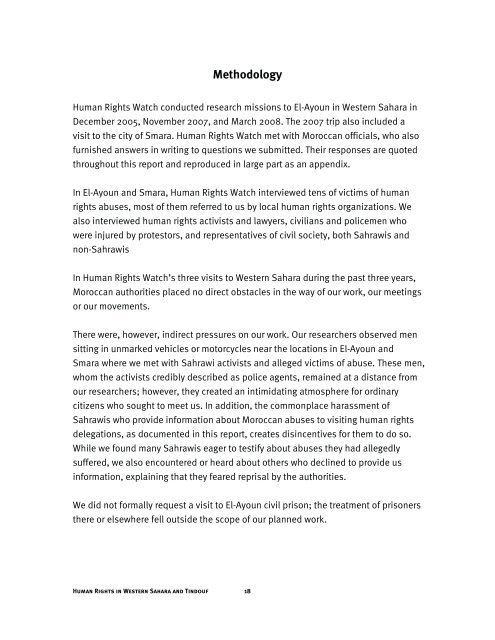Download full report with cover - Human Rights Watch
Download full report with cover - Human Rights Watch
Download full report with cover - Human Rights Watch
Create successful ePaper yourself
Turn your PDF publications into a flip-book with our unique Google optimized e-Paper software.
Methodology<br />
<strong>Human</strong> <strong>Rights</strong> <strong>Watch</strong> conducted research missions to El-Ayoun in Western Sahara in<br />
December 2005, November 2007, and March 2008. The 2007 trip also included a<br />
visit to the city of Smara. <strong>Human</strong> <strong>Rights</strong> <strong>Watch</strong> met <strong>with</strong> Moroccan officials, who also<br />
furnished answers in writing to questions we submitted. Their responses are quoted<br />
throughout this <strong>report</strong> and reproduced in large part as an appendix.<br />
In El-Ayoun and Smara, <strong>Human</strong> <strong>Rights</strong> <strong>Watch</strong> interviewed tens of victims of human<br />
rights abuses, most of them referred to us by local human rights organizations. We<br />
also interviewed human rights activists and lawyers, civilians and policemen who<br />
were injured by protestors, and representatives of civil society, both Sahrawis and<br />
non-Sahrawis<br />
In <strong>Human</strong> <strong>Rights</strong> <strong>Watch</strong>’s three visits to Western Sahara during the past three years,<br />
Moroccan authorities placed no direct obstacles in the way of our work, our meetings<br />
or our movements.<br />
There were, however, indirect pressures on our work. Our researchers observed men<br />
sitting in unmarked vehicles or motorcycles near the locations in El-Ayoun and<br />
Smara where we met <strong>with</strong> Sahrawi activists and alleged victims of abuse. These men,<br />
whom the activists credibly described as police agents, remained at a distance from<br />
our researchers; however, they created an intimidating atmosphere for ordinary<br />
citizens who sought to meet us. In addition, the commonplace harassment of<br />
Sahrawis who provide information about Moroccan abuses to visiting human rights<br />
delegations, as documented in this <strong>report</strong>, creates disincentives for them to do so.<br />
While we found many Sahrawis eager to testify about abuses they had allegedly<br />
suffered, we also encountered or heard about others who declined to provide us<br />
information, explaining that they feared reprisal by the authorities.<br />
We did not formally request a visit to El-Ayoun civil prison; the treatment of prisoners<br />
there or elsewhere fell outside the scope of our planned work.<br />
<strong>Human</strong> <strong>Rights</strong> in Western Sahara and Tindouf 18


